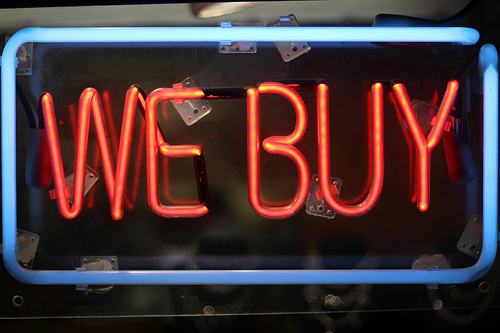

The latest Wired has a great piece by Matt Schwartz on what he terms "retail hacking".
He describes a confluence of forces that have given rise to the emergence of consumers who will devote hours to hacking the system to get deals and how this world has been made accessible to masses of consumers through the efforts of new players like Groupon and Living Social.
Groupon's genius, is to to take the time consuming and previously unattractive world of coupon shopping from the striving fringes of culture and make it mainstream cool. Getting a deal on Groupon is nothing to be ashamed of, instead, it's something you brag about. This is the reason Goggle is so interested in buying Groupon for billions of dollars.
Schwartz describes the emergence of the new deal-driven consumer- "the retail hacker".
"Take a step back, though, and what Groupon represents is something far bigger. It’s the mainstreaming of a new current in American consumerism, an attitude born of the Internet’s DIY ethos and nurtured by the hard economic times. One might call it retail hacking: the reconception of shopping as not just a full-time job but a contact sport, a scrum in which consumers increasingly refuse to buy on the terms dictated to them. A whole network of so-called deal-hunting sites, each with a large and devoted community, has sprung up for users to trade inside tips about little-known bargains; the largest of these sites, SlickDeals, has more than 700,000 registered members.
In this passionate consumer underground, techniques for chiseling a few percentage points (or more) off a sticker price can quickly spread to millions of shoppers. The process of selling a DVD player or even a new razor to the growing ranks of self-educated buyers is becoming as tortuous as selling them a new car. GetHuman.com, a continuously updated list of direct customer service lines and telephone-prompt guides, is undermining the ability of companies to resolve calls with automated systems. Consumers who have learned to haggle on prices at large chain stores—Target, Home Depot, Best Buy, and more—share their stories and methods on sites like the Consumerist, a blog that has become a hub for retail hackers. When Ely Rosenstock, a 29-year-old social media consultant from New York, wanted to cancel his Verizon service and buy the new iPhone, he found a loophole that let him leave his two-year contract with no termination fee; after he made this argument stick with Verizon customer service, he posted a detailed how-to video on YouTube that has been viewed more than 180,000 times."
The article implies that the way we think about selling, about deals and about pricing probably all needs to change. The forces of Web 3.0, "The Crowd", consumer empowerment and frugality are all coming together to create a radically new environment.
This is an environment that's forcing both brands and retailers to think differently about how they sell.
Posted by Ed Cotton
Flash sales sites seem to have what it takes to get recession weary shoppers to open their wallets and part with their cash. This is all about the "deal" and the genius of the sites is to make it easy for consumers to get access to exclusive products and knock down prices. The model works because of the limited-time nature of these offers and the understanding among shoppers that quantity is limited.
Gilt Group seems like an apt name, given that they are really in the business of making luxury shopping a "guilt-free" experience. There are no bags to be seen with, no hard to find sample sales to locate and the massive discounts on well-respected brands can clearly be identified and seen.
in today's retail environment, promotion is the name of the game and retailers aren't getting traffic into the stores with out it. There has to be a major reason for consumers to go into the store in the first place. They've become highly strategic and are masters of sniffing out great deals.
The power of the flash sale is that is forces consumers to make decisions and to buy. The interesting part, one that's currently under-developed, is the gaming aspect. There's a certain competitiveness that's part of the attraction- people don't want to miss out and there are several ways this might manifest itself.
We are certainly at the early stages of the development of the flash sale category,I expect we will soon see these tactics deployed by a host of retailers with their online stores, in addition to the emergence of a whole of host of new players beyond Gilt Group.
Posted by Ed Cotton
Although the whole notion of branding is based on making strong emotional connections with consumers, I wonder if many CFOs really understand branding.
Perhaps they see branding as a tool for operational efficiency- a way to make everything the same, so there don't have to be multiple versions or ad, signage and training binders.
Most of the time this consoldiation happens and it goes un-noticed, consumers have come to expect it, especially in categories like banking and teleommunications.
However, once in a while, consumers get upset when they see one of their beloved brands crushed by another, It looks like Macy's might be under attack in Chicago for getting rid of Marshall Field's.
"It’s been a year since Marshall Field’s vanished to make way for Macy’s. To mark the occasion, dozens of protesters gathered outside Macy’s huge State Street store, suggesting shoppers boycott the retailer and demanding a return of the Field’s imprint.
Chants of “Field’s is Chicago, Boycott Macy’s!” were heard and signs reading “Macy’s Go Home!” fluttered in the air. Protesters wore the green that distinguished Marshall Field’s shopping bags -- and a handful of women decked out in colorful 1890s-style dresses and hats -- marched around the square-block store, and drew honks from passing cars.
The store is one of about 400 properties nationwide converted last year to the Macy’s nameplate by Cincinnati-based Federated Department Stores Inc., which acquired them when it bought May Department Stores Co. in 2005. The move gave Federated more than 800 Macy’s stores in 45 states, the District of Columbia, Guam and Puerto Rico. Federated then changed its name to Macy’s Inc."
Via Pantagraph
One would think that Macy's did a little bit of research before they made the decision, perhaps a survey and some focus groups. They also would know that authenticity is an important consumer trend and that brands with heritage and history have considerable value. Perhaps they did all this and ignored the findings, because in the end, operational efficiency trumps brand meaning.
Finally, if anyone knows of any research on CFOs attitudes to brands and branding, please share.
Posted by Ed Cotton
